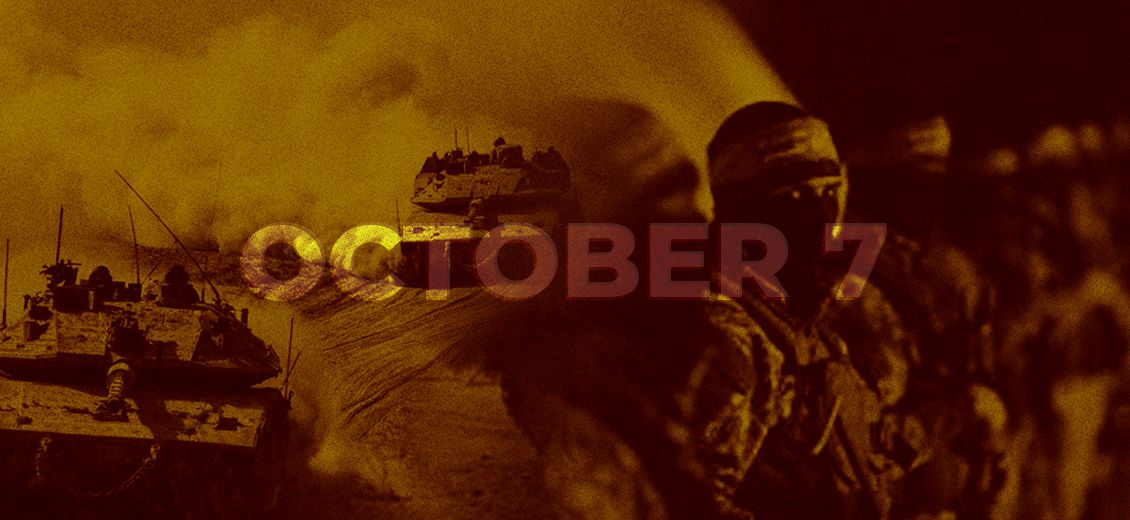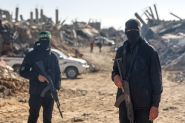- Home
- Middle East
- One Year After, the Fallacies of Apocalypticism

The violent outbursts of October 7, 2023, were portrayed as the last bouts of a war of liberation targeting Israel. This boring sloganeering, far from being a novelty, belongs to a trite repertoire of damning rhetoric that punctuated every single stage of the Arab-Israeli conflict.
Unfortunately, this rhetoric was paired with violence, repeated wars, and ideological blindness, which sabotaged a centennial legacy of active diplomacy and international resolutions. This conflict has failed, throughout a century, to oversee a working outcome and to put an end to the perpetuating cycles of violence and the rotating instrumentalization of the Palestinian scenery.
The latest Iranian episode doesn’t depart from a well-entrenched pattern of exploitation that hobbled negotiated solutions and contributed to further radicalization on both sides. The war dynamics, far from abating, have engulfed Gaza, the West Bank, Lebanon, Syria, Iraq, and Yemen, and transformed the whole region into an operational platform instrumented by Iranian imperialism.
The transformation of this conflict into a metonymic figure of speech contributed decisively to the political reification of the Palestinian question, to the pathetic state of belligerent self-pitying, and the victimhood pathos and their manifold instrumentations. There is no other political conflict on planet Earth that benefited from international shepherding in every respect. Still, the negotiated solution never inched away from the doldrums of negationism and fake moral absolutism. The repeated failures owed to political irrealism, to the outright rejection of international resolutions (1947 UN bipartition resolution, the Camp David Accords since 1979, the Madrid Conference 1991, the Oslo Accords 1993-1995, the Beirut peace plan 2002, the Olmert peace plan 2008, their ancillaries, etc.).
The ideological framing and moralism have undermined the chances of conflict resolution, impaired the moral and political autonomy of Palestinians, and furthered irredentism on both sides. Political realism lost ground to Islamist Nihilism among Palestinians, and political messianism took over the secular and pluralistic political mainstream in Israel. Islamic power politics hijacks Palestinian politics, and political messianism umpires the political game in Israel.
The US diplomacy is juggling the clashing agendas of Iranian imperialism and its regional proxies, the critical issues of Israeli national security, the paradoxes of Palestinian national politics and their shifting tectonics, and the imponderables of an imploded Arab world where the overlapping crises of national legitimacy, ethnopolitical and religious conflicts, and the socio-economic and ecological imbalances are driving ahead and undercutting the chances of negotiated political solutions all along the Middle East.
Iranians are in full control of the Palestinian political scene, Palestinians are unable to achieve a modicum of internal unity and are pliable to Islamic power politics, and the Israelis have to address the political and humanitarian emergencies of the hostage crisis and finish off with the security hazards of Hamas-controlled Gaza and the wastelands of southern Lebanon and northeast Syria.
The ordering of priorities is an overwhelming task in terms of sequencing what comes first: the future of Gaza’s governance, the negotiation partnerships, the release of Israeli hostages and Palestinian prisoners, the relationship between truce management and peace agreements, etc. Iranians are unwilling to concede to their overriding political prerogatives, determined to seal off their dominions and manage them through their proconsuls and proxies and maintain them under firm control. Iran’s political suzerainty and diktat transform Hamas and Hezbollah into mere ancillaries instrumentalized by the shifting priorities of Iranian power politics. Put in other words, how can we reconcile the short-term mandates of hostage liberation, the truce in southern Lebanon, and the likelihood of a peace agreement with the maintenance of the Iranian imperial outposts and arbitrary power projections?
The war in southern Lebanon ushers in a new stage in the ongoing conflict and points to the fact that Israel has overhauled its strategy, which overcomes the restoration of security in northern Israel. The actual narrative aims at challenging the Iranian hegemony, doing away with its bolts, and launching a new political dynamic based on a renewed power configuration. The destruction of Hezbollah is the prelude to a counter-offensive that questions the deadlocks set by Iran and the eradication of its political and strategic pillars by reversing the politics of "unified battlefields," changing the political dynamics throughout the arc of conflict (Lebanon, Gaza, Palestinian Territories, Syria, Iraq, Iran) and preempting the nuclear militarization.
However difficult the undertaking, Israelis, despite their political and ideological differences, have come to terms with the existential threats featured by Iran and the urge to change the military dynamic tacitly endorsed by Arab moderate regimes and the US, which perceive its timeliness while carefully weighing its imponderables. The annihilation of the leading movement of subversion and its ripple effects is a powerful lever that should be instantly seized upon to permute the political and military equations. The shattering of the military and political canopy should come at the heels of Hezbollah’s destruction and open up the path to a new political dynamic and the repositioning of the Israeli-Palestinian conflict and its resolution.
Apocalyptic politics are non-political by definition since they are unlikely to pave the way for political accommodation, compromise, and democratic conflict resolution. None of the categories of a working democracy apply to divine injunctions, demonization, and damnation mantras. Short of a new configuration of power relationships, one can hardly see a chance for working negotiations based on moral reciprocity and gradual conflict resolution. Israelis, notwithstanding their serious political differences, are impermeable to the restoration of the security status quo ante, and rightly so. Hamas and Hezbollah are still manipulating their apocalyptic falsehoods and their leadership, catering to their vested political and financial interests, at a time when their immoral and disastrous policies have tragically degraded the Palestinian political fortunes like never before and undercut Lebanon’s civil stability and national legitimacy. The war in Lebanon has set a watershed, and the whole political and military dynamic has substantially changed.
Unfortunately, the nihilistic drifts have predominated so far and do not seem to yield terrain for a mundane understanding of politics. In the meantime, civilians take the brunt of apocalyptic fallacies and their cohort of tragedies. The tragic fallouts of war in Lebanon and Gaza attest to the fallacies of apocalyptic narratives and their deleterious effects on peacemaking. The new order of priorities should favor the unconditional liberation of hostages, the internationalization of the Gaza status, the annihilation of Hezbollah, and the permutation of the Iranian power politics configuration. Otherwise, the interlocking power politics are a bad omen, and the end of hostilities is out of sight.
Read more



Comments